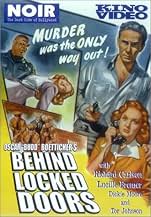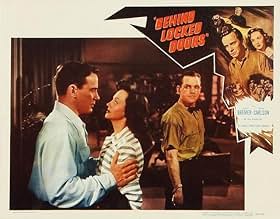A well-known judge has become a fugitive from the police, with a large reward on his head. A reporter believes that the judge is hiding in a private sanitarium, so she seeks out a private in... Read allA well-known judge has become a fugitive from the police, with a large reward on his head. A reporter believes that the judge is hiding in a private sanitarium, so she seeks out a private investigator and asks him to pretend to be insane, so that he can get inside the sanitarium ... Read allA well-known judge has become a fugitive from the police, with a large reward on his head. A reporter believes that the judge is hiding in a private sanitarium, so she seeks out a private investigator and asks him to pretend to be insane, so that he can get inside the sanitarium and look for the judge. The investigator is admitted to the asylum, and encounters many da... Read all
- Dr. Clifford Porter
- (as Tom Brown Henry)
- Mr. Purvis - a Patient
- (uncredited)
- Mr. Topper - a Patient
- (uncredited)
- Nurse
- (uncredited)
- Dr. J.R. Bell
- (uncredited)
- Trooper Captain
- (uncredited)
- 'The Champ' - a Patient
- (uncredited)
- Jim
- (uncredited)
- Maintenance Man
- (uncredited)
Featured reviews
You'd have to be crazy to go there, because while its name promises cozy afternoon naps, what it delivers is apt to be the big sleep. Private eye Richard Carlson doesn't want to go either, but he up and falls for a reporter (Lucille Bremer) who persuades him to do the inside legwork on a story she was after. (A corrupt judge has vanished, and his girlfriend has been making nocturnal visits to La Siesta, where she's ushered in through a side door.) So they fool a doctor in giving Carlson a diagnosis of manic depression, and he becomes an inmate.
Inside, Carlson uncovers a web of secrets and lies, enforced by sadistic attendant Douglas Fowley with the help, as a last resort, of a punch-drunk prizefighter who's kept in a cage-like cell (Tor Johnson, who also graced Plan 9 From Outer Space). The intrigue centers around the judge, who's paying off the head of the hospital to hide him. But, when suspicions are raised by a deliberate act of arson, Carlson becomes the top item on the hit list....
At barely more than an hour, the movie doesn't have any time to waste, so Boetticher moves at a pretty fast clip (only the ending seems rushed). He lays on the shadows, too, with characters ominously silhouetted against walls and doors. More of an old dark house story, really, than a more freighted and ambiguous noir, Behind Locked Doors sets its sights modestly but achieves them handily.
Note: The plot summary of this movie in the `bible' Silver and Ward's Film Noir: An Encyclopedic Reference to the American Style is hopelessly garbled, as though two different films had become confused.
Private detective Ross Stewart (Carlson) is coerced into going undercover at the La Siesta Sanitarium in search of a corrupt judge that reporter Kathy Lawrence (Bremer) believes is hiding out there. Getting himself committed under the guise of being a manic depressive, Stewart finds more than he bargained for once inside the gloomy walls of the asylum.
Clocking in at just over an hour in length, Behind Locked Doors is compact and devoid of any sort of flab. Firmly a "B" asylum based pot boiler of the kind film makers always find fascinating, it's a picture dripped thoroughly in noir style visuals. This not only pumps the story with atmosphere unbound, it also allows the economically adroit Boetticher to mask the low budget restrictions to make this look far better than it had any right to be.
Cure or be killed!
Narratively it's simple fare, undercover man uncovers sadistic humans entrusted to care for the mentally ill. The "inmates" are the usual roll call of the unfortunates, the criminally inclined or the outright hulking maniac. There's a good male nurse who we can hang our hopes on, we wonder if our intrepid protagonist will survive this perilous assignment, and of course there's a love interest added in to spice the human interest factor.
Cast performances are effective for the material to hand, but without the said visual arrangements of Boetticher and Roe the characterisations would lack impact. The camera-work shifts appropriately with the various tonal flows of the story, angles and contrasts change and with the picture almost exclusively shot in low lights and shadows, the Sanitarium is consistently a foreboding place of fear and fret. And not even some rickety sets can alter the superb atmospherics on show. 7/10
The story opens with a reporter visiting the office of an inexperienced private investigator (Richard Carlson), with a proposition. The reporter believes that she knows where to find a prominent judge who has become a fugitive from the police (and for whom there is a $10,000 reward). She thinks that the judge is hiding in a private sanitarium, and wants the investigator to pretend to be insane so that he can get inside and find out. Most of the story that follows takes place inside the asylum, as the investigator tries to find the judge and stay out of danger.
The asylum setting is done well, and furnishes a suitable atmosphere. They use the setting in several ways to further the action, most notably with horror-film favorite Tor Johnson appearing as a dangerous inmate, along with a number of other strange inhabitants. The unusual setting adds considerably to the more routine aspects of the film.
"Human Gorilla" (also called "Behind Locked Doors") works rather well, and this is not a bad movie to check out if you like film noir or crime movies, and wouldn't mind the generally low production values.
This is a very good zero-budget B thriller about a sadistic mental asylum. A corrupt judge who was meant to be sent to jail is on the run and hiding out in this asylum, which is run by a corrupt crony of his. So Lucille Bremer (in her last film) decides to try to collect the $10,000 reward for his capture by the police. She approaches Richard Carlson, a handsome and engaging private dick on his very first case, with the proposition that they split the reward if he will pretend to be her husband and be a manic depressive, and get himself committed to the asylum, which he does. But things go wrong! The asylum is a sadistic and criminal institution, and Carlson now cannot get out. Everybody's worst nightmare! The judge is hiding in the locked ward adjoining the violent psycho cases. One of these is 'the Champ', a psychotic former boxer who still thinks he is in the ring and wants to punch everybody to death, hence has to be kept in a locked ward. He never speaks and is wonderfully played by Tor Johnson, with such a mournful, tormented expression, glassy eyes, and as if totally stoned. No prizes for guessing that someone might end up locked in with him! Things get really sticky, and Lucille who is on the outside has to figure out some way to help Carlson who is on the inside, and time is running out. What can be done? I won't tell!
Richard Carlson is good, very good, as the main character. The supporting cast is excellent. It's a tough little story.
Don't expect an expose like "The Snake Pit" or metaphor like "Shock Corridor." The sanitarium itself is one of the problems: Would a private sanitarium really have such sadistic, violent staff? It comes across much more like a state psychiatric hospital.
Also, the rationale behind the woman's action is never really clear.
However, it's a very scary movie, with no fat at all. The character's loss of his true identity once he's behind the doors is reminiscent of another small, though better, movie: "My Name Is Julia Ross." In passing, I wonder whether that movie, "When Strangers Marry," and the entire Republic noir catalog still exist. The first two are superb little movies that pack tremendous wallop. "Julia Ross," though atypical of the genre in many ways, may be my single favorite film noir. Where are these movies? And why don't we ever see the Republic noirs of the 1950s? That, however, is a digression. This movie is very well worth seeing. It's very tense and exciting and has fine character development.
Did you know
- TriviaFinal film of Lucille Bremer.
- Quotes
Ross Stewart: Kathy, you're my first client. Shall we celebrate by my carrying you across the threshold?
Kathy Lawrence: Oh, it's such a nice day, I think I'll walk.
- ConnectionsReferenced in Budd Boetticher: A Man Can Do That (2005)
Details
- Runtime1 hour 2 minutes
- Color
- Aspect ratio
- 1.37 : 1
Contribute to this page































